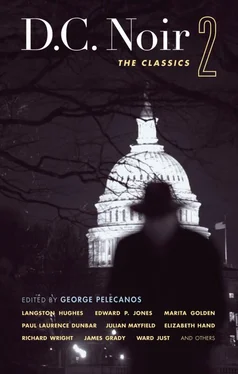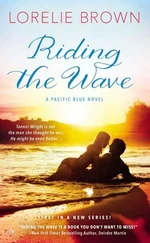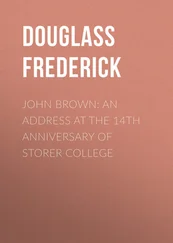Bitterman slowly reached out for the gun. The boy’s eyes snapped into focus and he tried to pull away. Bitterman grabbed for the gun. It swung up toward his face, he pulled it down toward his chest and slammed the kid in the head with his pistol. The .38 went off and Bitterman fell back gasping. Dantreya Watkins hit the floor and lay still.
Bitterman, on his back, reached up and touched his chest. He could feel the .38 embedded in the Kevlar. God, did he hurt and was he glad he could say it.
He lay there on his back, like a Kevlar turtle, his hands clenching with the pain of each breath. He saw Sunshine push Lufer Timmons up off of her, until she was clear of his now and forever limp penis, roll out from under it, stand up and stagger to the door without a backward glance. Bitterman tried to call out to her for help but could only groan instead, as she banged her way down the stairs. The front door slammed and Bitterman lay there in the enveloping silence waiting for the sounds of backup: screeching tires, sirens, pounding footsteps. Above all else he wanted there to be someone in a hurry to find him. Bitterman closed his eyes and whispered, “Merry fucking Christmas.”
After
(excerpt)
by Marita Golden
(Originally published in 2006)
Woodmore, MD
The bullets discharge from the muzzle of Officer Carson Blake’s sixteen-round Beretta with the tinny, explosive popping sound of a toy gun. He will not remember exactly how many shots he fires so wildly. Fires with pure intent. Fires, he is sure, to save his life. In the first seconds after the shattering sound of the bullets subsides, he would say, if asked right then, that he had fired every bullet in his gun. Never before has his gun been so large. Never before has it weighed so much. He’s dizzy and breathless. His heart beats so fast, he can’t believe he is still standing.
When he shoots the man, everything, all of it, unfolds as if in slow motion. He wants to look away. He dares not turn his gaze. The first bullet boring through the man’s thick neck riddled with razor bumps, the force twisting his head to the side, as though he is looking with those astonished, horribly open, not yet dead eyes to see where the bullet comes from. The second bullet piercing the skin of the black leather jacket, lodging in the flesh of his shoulder. The third bullet, fired at his groin, bringing him to his knees and then onto his face, sprawled flat out on the parking lot forty feet from the entrance to the Chinese restaurant The House of Chang.
Carson stands staring at the man on the pavement, his body a bloody heap illuminated by the fluorescence of the mall parking lot lights, and sees the cell phone a few feet from the man’s hand, and he prays for the ground beneath his feet to shift in a cataclysmic rumble and swallow him whole. A cell phone , he thinks, unbelieving. A cell phone . Not a gun. He hurls a howl, deep and guttural, into the night. Sinking to his knees, he touches the man, turns him over onto his back, sees the bulbous, bloody wound in his neck, smells the sharp odor of his sodden groin, desperate now to find, to feel, a pulse. There is none. There is only the cell phone. Looking up in desperation, Carson sees a sky unfamiliar and frightening, in which he can fathom not a single star, a vastness that makes him wish for wings.
Carson tries to stand but cannot, and he crawls a few feet away and vomits. When there is no more sickness to spill from his gut, he wipes his mouth and shouts at the dead man, through trembling lips stained with a blistering splash of tears, “What the fuck were you doing? Why didn’t you just do what I said?”
There is nothing on this night that hints at disaster. After twelve years on the force, Carson can tell when a shift will be hell on wheels. On those shifts, the dispatcher begins reciting an address and an “incident” (car crash, domestic disturbance, robbery, brawl, accident, murder) even before Carson is belted behind the wheel. Then there are the calm, quiet shifts when hour after hour he’s numb with boredom, cruising the nine square miles of his police service area, and after a couple of hours he begins looking for a safe place to park and take a nap.
But he can’t get bored. Because bored he won’t see the obvious — the missing tags on a beat-up hoopty driven by a carload of young punks looking for trouble and determined to find it. But this night he is bored by 9:45, when he walks into a 7-Eleven near the litter-filled streets of a housing project known as “The Jungle” to buy coffee and a doughnut: Carson ignores the group of high school — age boys hanging out in front of the store at almost ten o’clock on a school night, rapping, jonin’, joking, lying. Matches waiting to be struck. Don’t they have homes? Carson wonders for the thousandth time, then recalls what he has seen in some of the homes these boys live in — rats, roaches, three kids sleeping on the living room floor, toddlers playing near stacks of cellophane-wrapped crack cocaine, no heat in the winter, stifling ovenlike apartments in the summer, overworked mamas, long-gone daddies. Those homes make the parking lot of 7-Eleven seem a step up in the world.
Still, why the hell were they standing outside to talk? Just hangin’ . He’d read somewhere that this was street corner culture, an integral part of the Black experience. Some urban ritual. But this is Prince George’s County. No inner-city street corners here, like in nearby D.C. But niggahs, he thinks sullenly, can turn anyplace into a ghetto .
Nearly all the arrests he’s made, all his stops, involve boys like the ones he barely looks at as he passes by, feeling them grit on him with a steely stare because he’s a police officer. To them he’s a cop and he is, in their eyes, the enemy. He’s fed up with arresting young Black males — aimless, directionless, often involved in nonviolent crimes that set the stage for all the shit that hits the fan in their young lives. Just last week he was called to the scene of a shooting and saw a kid no more than seventeen, dressed in spanking new jeans, two-hundred-dollar Air Jordans, and a Phat Farm sweatshirt, loaded into the Emergency Services vehicle, dead . Shot in the back while standing outside a Popeyes, from the passenger side of a Crown Vic that careened past the spot where he stood munching on a spicy chicken breast and a biscuit while talking to his baby’s mama. The car didn’t even slow down to make the hit. As Carson watched the EMS vehicle drive away, he wondered how many hits the kid had made. Revenge, payback, and a brutal, bloody synchronicity ruled the lives of too many of the young men he arrested. He saw precious few truly innocent victims. Predators, that’s what he calls them, kids like that fourteen-year-old who walked into a convenience store in Oxon Hill and tried to rob it at 5 a.m. and ended up stabbing the Korean owner to death. What the fuck? Carson sometimes wonders. God damn, my people, my people, envisioning the future of the race in every act and every choice these young men make. He’s tried to talk to them, standing in groups like these or in handcuffs in the backseat of his cruiser, but he might as well be speaking Mandarin.
So yeah, he is tough, and he is hard on their Black asses. There but for the grace of God … He has a son who in his worst nightmares turns into a wannabe thug giving these young bloods a run for their money. None of it makes sense. On more than one shift he’s arrested suburban Black boys from Leave It to Beaver homes, hungering to be criminals, proving their street smarts by being stupid enough to land in jail. He’s arrested boys with a plasma TV in their basement and their father’s BMW SUV and mom’s Lexus and their Honda parked in the garage. He’d been a young punk once too, angry, feasting on his own sense of deserved and superfluous rage at a world he couldn’t control and that he was sure would never give him room. But bored, this night, Carson doesn’t even say a word, just figures his presence, the patrol car, the weapon the boys know is in his holster, will do all the talking for him. He swaggers past the cluster of boys, all of them dressed in baggy jeans and oversize shirts, blue bandanas tied around their cornrowed heads. Carson strides a bit more forcefully than usual, preening to let them know that the convenience store is his turf, not theirs.
Читать дальше











